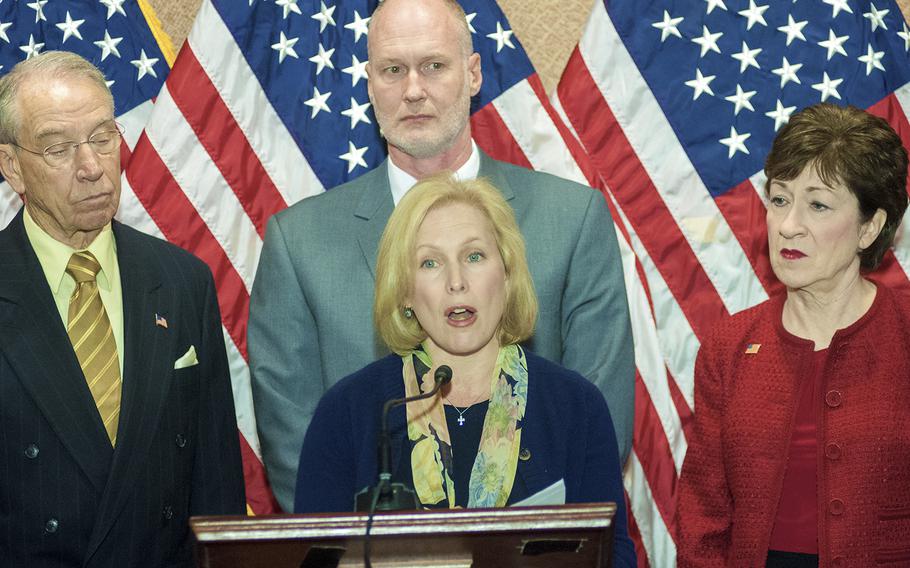
Sen. Kirsten Gillibrand, D-N.Y., speaks Tuesday, Dec. 2, 2014, during a briefing on Capitol Hill where a bipartisan group of senators voiced their support to change the military’s prosecution of sexual assault cases. Behind Gillibrand is retired Col. Don Christensen, the former chief prosecutor for the Air Force who called the military legal system broken. Sen. Chuck Grassley, R-Iowa, and Sen. Susan Collins, R-Maine, flanking Christensen were among the lawmakers at Tuesday's event. (Carlos Bongioanni/Stars and Stripes)
WASHINGTON — Senators on Tuesday rekindled efforts to remove military sexual assault prosecutions from the chain of command via a last-minute addition to the defense budget.
Sen. Kirsten Gillibrand, D-N.Y., along with a bipartisan coalition of nine fellow lawmakers, said a separate military criminal justice track for the cases should be rolled into an annual budget agreement expected from Congress in the coming days. The move also comes as the Defense Department is poised to release new data on assaults in the ranks.
The proposal won widespread support in the Senate earlier this year but was narrowly defeated by a filibuster. Gillibrand said it was being reintroduced in the last days of Congress’ lame duck session because the military is not solving a long-standing epidemic of sexual assaults and an entrenched military culture of acceptance.
“We are here to say the military has not been able to demonstrate they have made a difference, and they need to be held to that scrutiny and standard this year,” Gillibrand said.
The senators planned to float an amendment to the National Defense Authorization Act, which sets the Pentagon budget but has been delayed for months. The House and Senate have been meeting to hammer out a bill to be passed before the end of the year.
Gillibrand said outgoing Defense Secretary Chuck Hagel is expected to present new militarywide data on sexual assaults to President Barack Obama this week, but that numerous media reports over the past year of victims who were retaliated against and military perpetrators who received lenient punishments shows that Pentagon efforts are not working.
Sen. Chuck Grassley, R-Iowa, said an act of Congress has become necessary.
“In Washington, promises of reform are often just promises until an institution is forced to reform,” Grassley said. “The military approach to sexual assault seems to be a brick wall that won’t crumble under the usual pressures here in town.”
Military commanders, called a convening authority, now decide what charges will be brought against sexual assault suspects, how cases will be tried, and who will sit on court-martial juries, said Don Christensen, former chief prosecutor for the Air Force who now advocates for military legal reforms and appeared on Capitol Hill with the Senators Tuesday.
“It is a system set up for failure” because those military authorities often have little legal training and can be closely associated with suspects, Christensen said.
The bill would create a separate military prosecutor outside of the typical chain of command to try cases of alleged sexual assault.
Senators said the military has been promising for decades to reduce assaults and change its culture but has been unable to deliver despite embarrassing media reports over the past year.
The Pentagon report An anonymous biennial workplace and gender relations survey, which tracks sexual harassment and sexual assault in the active-duty and reserve forces, could be released by DOD this week.
This year’s version, developed by the RAND Corporation, is unusually detailed, raising questions about continuity in reporting.
Gillibrand said in April that the change could hinder efforts by the Pentagon and advocacy groups to track progress in preventing and responding to sexual assault in the military. In particular, Gillibrand said she was concerned about possible changes to the definition of “unwanted sexual contact.”
An estimated 26,000 troops had experienced some kind of unwanted sexual contact or sexual assault, according to the results of the 2012 survey. That same year, there were 3,374 sexual assaults reported in the military.
A DOD spokeswoman said in April that the Pentagon hired RAND because of prompting from Congress to have an outside organization conduct the survey, but that the methodology would allow the Pentagon to compare previous data and “seamlessly assess the progress the department is making.”
Sen. Claire McCaskill, D-Mo., championed a bill that changed the way the military handles sexual assaults, but does not go as far as Gillibrand’s proposal. It took from commanders the ability to overturn convictions, requires that victims of sexual assault have access to specially trained military lawyers, and requires review by the service secretary if a commander decides not to go to trial against the recommendations of a prosecutor, among other reforms.
Stars and Stripes reporter Jennifer Hlad contributed to this report.